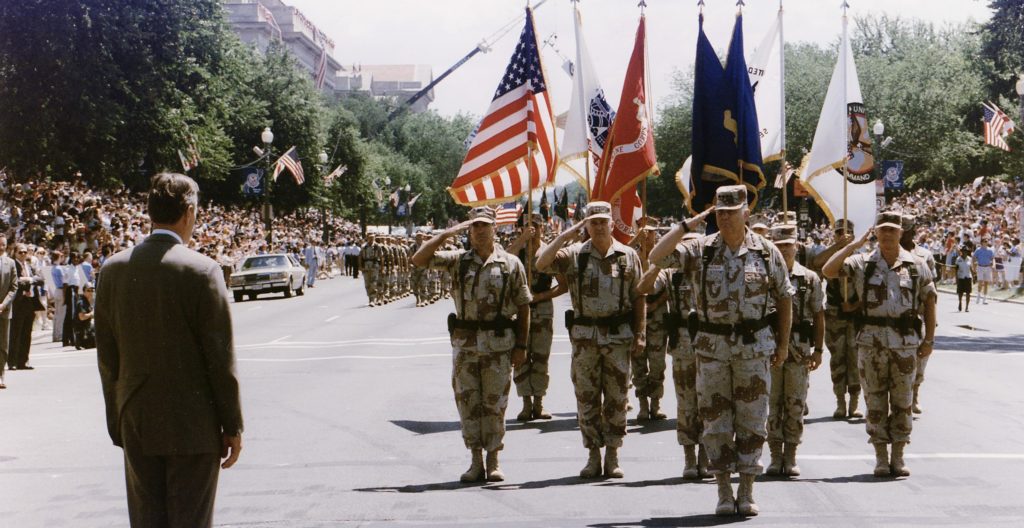Veterans Day: Not To Be Taken Lightly
By • November 10, 2022 0 1900

Veterans Day – a U.S. federal holiday observed each year on November 11 – is designed to honor military veterans of the U.S. Armed Forces. Following the First World War (1914-1918), the day was originally commemorated as Armistice Day, marking the official ending of the bloodiest world war in history until then, The Great War. At precisely the 11th hour of the 11th day of the 11th month of 1918, the Allied armistice with Germany took effect and the battling ceased. In 1954, Congress officially changed the holiday’s name to Veterans Day.
Today, many confuse Veterans Day with Memorial Day (which falls on the last Monday in May). Memorial Day, however, is a federal holiday honoring those who’ve died in military service to the country – the supreme sacrifice – rather than those who’ve served honorably as veterans.
Each year at this time, we hear rousing complaints about the commercialization of Veterans Day and how the day should be observed with much more than special deals and opportunistic promotional sales in “honor of our veterans.” And this is to the good.
Our views of veterans and the sacrifices they and their families have made are too often under-appreciated, despite the Veterans Day hype we see around us in the fall season.
We tend to view military service through the lenses of each generation’s most traumatic and defining wars and conflicts. For Americans following the First World War, there was much to celebrate. Germany’s aggression was checked, and the U.S. would rise as a major world power having “saved the world for democracy” following German attacks on American submarines and shipping.
After the Second World War (1939-1945), Americans also had reason to celebrate the heroic contributions of U.S. veterans who had sacrificed so much to roll back Hitler’s European conquests, helping to save the world from fascistic Nazi rule as well as the tyranny of Japanese ultra-nationalism.
During the Cold War, however, major doubts about American military interventions increased, casting doubts over what U.S. military service meant. In the Korean War (1950-53), most Americans, though weary of warfare so soon after the Second World War, could rally behind a U.N.-sanctioned intervention to push back North Korean communist aggression against South Korea in order to “save South Korea” from communism.
With the Vietnam War (1955-1975), however, views of U.S. military service shifted dramatically. As young men – who couldn’t vote until age 21 yet were subject to the draft – increasingly questioned the wisdom of “fighting communism” in the far Pacific following French colonial departure, growing anti-war sentiment melded with a rising Counter Culture movement to bring a halt to the war. By the time U.S. troops evacuated Vietnam in 1973, a rising majority of Americans began to question official U.S. military pronouncements about the war, many of which turned out to be misleading. Vietnam veterans returning from the war – America’s first military “loss” –often faced harassment from counter-war protesters.
Since the Vietnam War, the only challenge to the view that the U.S. should avoid foreign conflicts whenever possible and that U.S. military and intelligence analysis should be treated with skepticism came following the terrorist attacks of September 11, 2001. But, after the U.S. became mired down militarily in both Afghanistan and Iraq, a majority of Americans wanted out of these “forever wars,” a term used in the 2020 presidential campaigns of both Joe Biden (D) and Donald Trump ( R ) simultaneously.
As a former high-school history teacher who served eight years in the U.S. Naval Reserve (1997-2005), I often pointed out to students the shifting historiographical views on American warfare to be found in history textbooks. You can always tell when historians have been shaped by the post-Vietnam paradigm. For these historians, American warfare is a never-ending “march of folly” (as Barbara Tuchman portrayed the First World War) wherein imperialist, capitalist interests combine under patriarchal leadership to exploit the armed forces for their own mis-guided ends.
When I showed clips from the PBS series “The Great War,” I often challenged Cambridge historian Jay Winters’s contention that the First World War was a colossal act of absurdity by European leaders because millions of men’s lives were lost over just a few entrenched miles on the western front. “Was it absurd for the French troops to try to protect Paris?” I would ask, or for the Belgians or the Russians to resist German invasion?
And I felt these changes in my own life. My grandfather and my father served as pilots in the First and Second World Wars. Their service always appeared to be a source of pride and rightfully so.
When I signed up for the U.S. Naval Reserve in 1997, many asked me why I bothered. Following the attacks of September 11, 2001, I began to receive praise for my devoted service. But, after the War on Terror went sour in Afghanistan, Iraq and around the world, my service was again treated by many – teachers, students, parents, friends – as questionable if not somewhat nefarious.
Views of military service appear to be shifting once again, however. Today, Russian aggression into Ukraine and the heroic struggles of the Ukrainian defense forces puncture the notion that all warfare is “folly.” We can be thankful that the NATO defensive alliance has advanced weaponry and surveillance capability to provide the Ukrainian fighters in their hour of need and that news has come of Russian offensive military collapse and retreat of occupied cities.
All war is not absurd. As much as “war is hell” – and it is – there are pressing times in the course of history when it needs to be waged all-out in order to survive unprovoked attacks and invasions that would crush civic freedoms.
Tomorrow, on Veterans Day, try to appreciate why U.S. service members signed up in the first place: To help protect home and hearth.

